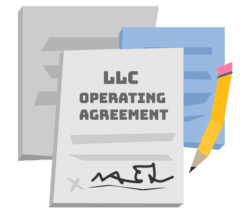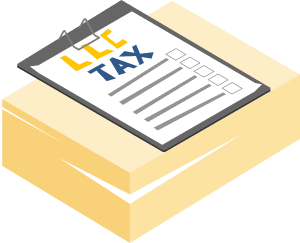How to Start an LLC in Pennsylvania
Pennsylvania LLCs offer business owners strong liability protection in an easy-to-manage business structure. Pennsylvania charges $125 to form an LLC, but compared to other states, maintenance fees are low—you’ll only need to pay $7 a year to keep your LLC active.
To register your LLC, you’ll file a Pennsylvania Certificate of Organization and a Docketing Statement with the state Bureau of Corporations and Charitable Organizations. You can file this paperwork on your own, or hire someone (like Northwest) to do it for you. You’ll also need to take a number of other steps to meet federal government requirements for your new business and safeguard your privacy and liability protection. Here’s how it’s done.

1. Name Your LLC
The first thing you need to do is choose a business name. You might already have an idea for what you want to call your company, but you’ll need to make sure it’s valid under state statute and available for your use.
Pennsylvania naming rules can be found in 15 PA Cons Stat § 202-204, but to sum up, your LLC must:
- Include limited liability company, limited, LLC, company, or any other word or abbreviation allowed for PA LLCs.
- Not imply the business is something it’s not, like a bank or government agency.
- Be one-of-a-kind! If your business name is already in use in Pennsylvania (or too similar to another name), your filing will be rejected, so check to see if your name is available with a Pennsylvania Department of State Business Search.
Tip: Even if your name is available in Pennsylvania, it might still be under federal trademark. That won’t prevent you from using the name, but may expose you to legal action in the future. A Trademark Clearance Search can save you a headache down the line.

2. Get a Domain Name
A website domain that matches your business name will improve search engine visibility, driving more customers to your doorstep. Northwest makes it easy and can get you a domain instantly. In fact, all of our LLC customers get:
- One year of free domain registration.
- A customizable business website that’s kept safe with top-shelf SSL security.
- Up to 10 professional business email addresses.
- A business phone number with local area code.
- Friendly Corporate Guides®; have questions about a filing or form? We have answers!

3. File a Pennsylvania LLC Certificate of Organization
When registering your business, you’ll submit Certificate of Organization and Docketing Statement forms to the Pennsylvania Bureau of Corporations and Charitable Organizations. Your LLC officially exists after the bureau approves those documents. When you file online, the Certificate of Organization and Docketing Statement are combined into one form. However, if you file by mail, you’ll need to fill out and submit two separate forms.
Again, the name must include some version of LLC and be unique among business names in Pennsylvania.
Tip: When filing online, you’ll be asked if you’ve optionally reserved a business name in advance, but if you’ve checked availability prior to filing, just click “no.”
A registered agent is a person or company that you designate to receive official mail on behalf of your LLC (Pennsylvania actually requires you to list a “registered office,” but the same basic requirements apply). Designating a registered office is legally required in Pennsylvania. If your LLC is served with a lawsuit, the registered office is where the paperwork will be delivered to your business. After your registered office accepts that document, your business is legally considered “served,” and the registered office should then promptly get that notice to you.
Legally, your Pennsylvania registered office must:
- Be a physical street address (not a PO box or virtual office) in the state.
- Be open at that address during regular business hours.
- Have someone present who can accept service of process on behalf of your business.
You’ll need to list your registered agent’s name and (if they’re not a commercial service like us) Pennsylvania street address.
Tip: You can operate your own registered office if you meet those requirements, but if you’d rather not be rooted to a single location all day long, or want to stay more private with your LLC, you can hire a professional (like us) to do that for you.
An organizer is just the person who signs and submits your Certificate of Organization, and doesn’t have to be a person in your LLC. But remember: your organizer’s information becomes public record. If you hire Northwest, we’ll be your organizer and list our information here.
This is where you decide if your LLC should become active immediately, or on a future date—like if you put off your effective date until the start of a new tax year. Most LLCs become active immediately.
If your LLC will provide certain state-licensed services (in the fields of medicine or law) listed on the form, you’ll need to indicate those services here. This will form your LLC as a professional limited liability company (PLLC) whose members must maintain those professional licenses.
Check the box if your LLC will be a benefit company (which provides a specific public benefit like education, but can also make a profit). Benefit companies have additional filing requirements.
You have the option to attach additional documents, such as member/manager information or government approval documents (if needed).
The Docketing Statement is included with the Certificate of Registration online. If you file by mail, it’s a separate form, but you’ll send in both documents at the same time. It asks you to provide a brief description of your LLC’s business activity, the name and address of whoever will file tax reports, a brief description of business activity, and your tax or fiscal year end date.
Tip: The Docketing Statement also asks for your FEIN (Employer Identification Number), but you can leave that blank, since you’ll probably only get your FEIN after your LLC is formed.
Listing this is optional, but the $125 filing fee is waived if you’re a veteran or active reservist.
How do I “file” a Pennsylvania Certificate of Organization?
“Filing” simply means getting your paperwork to the Pennsylvania Bureau of Corporations and Charitable Organizations with the correct filing fee ($125). The Bureau of Corporations no longer provides online forms to print and mail. This means you must file online through the Pennsylvania Department of State’s One-Stop Shop online portal.
Note: To file online you’ll need a One-Stop Shop account. You can get one here.

4. Adopt an Operating Agreement
An operating agreement is document that determines how your LLC should operate. Any good operating agreement ought to cover rules for any important functions of your LLC, like member voting procedures, the allocation of profits, and how to resolve disputes.
Operating agreements are internal documents your LLC should keep on record. They may not be not be required by Pennsylvania law, but virtually any LLC benefits from having an operating agreement. Your LLC will need an operating agreement early on because banks usually need to see one before opening a new business bank account. And if disputes happen between LLC members in the future, an operating agreement that covers the issues in question might even spare you from legal trouble.
Tip: Writing an operating agreement isn’t easy, so our attorneys drafted an operating agreement specifically for use in Pennsylvania, and you can use it for free.

5. Get an EIN
Your LLC almost certainly needs an EIN (sometimes called a FEIN). An EIN is a nine-digit number that the IRS assigns your business for tax identification purposes, a lot like a Social Security Number. EINs are frequently required when opening a business bank account, applying for loans and licenses, and paying taxes—and if you don’t have one, you’ll have to use your SSN instead, so an EIN helps protect your personal identity, too.
Note: You can apply for one online with the IRS or hire us to handle it for you.

6. Get a Business Bank Account
Personal finances and business finances shouldn’t mix. When they do, it’s considered “piercing the corporate veil” (which sounds mysterious, but simply means a court has found you and your LLC aren’t separate entities like they should be). This is why you need a business bank account for your LLC, to help keep those finances separate.
Note: Most banks will want to see your LLC’s operating agreement, EIN, and an LLC Resolution to Start a Bank Account.

7. File State Reports & Taxes
Most states have some sort of annual or biennial reporting requirement. Pennsylvania used to be hands-off about business reporting, only requiring a decennial report (that’s one report every ten years). However, starting in 2025, LLCs must file a report with the Pennsylvania Department of State every year before October 1. It costs $7 to file and requires basic information about your LLC.
Note: Keep things simple and hire us to file your Pennsylvania Annual Report for you.
Ready to Start an LLC in Pennsylvania?








